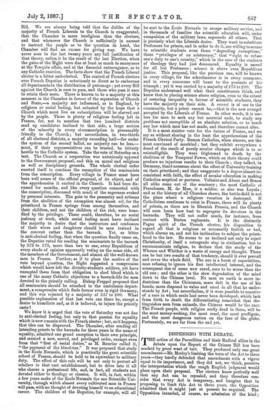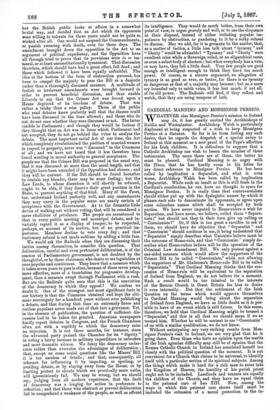DISPENSING WITH DEBATE.
THE action of the Parnellites and their Radical allies in the debate upon the Report of the Crimes Bill has been marked by great want of tact. They produced only one great amendment—Mr. Morley's limiting the term of the Act to three years—they hardly defended that amendment with a vigour equal to its importance, and they did not, we think, perceive the interpretation which the rough English judgment would place upon their proposal. The electors know perfectly well that any Act can be repealed, and they therefore con- sider that every Act is temporary, and imagine that in proposing to limit this Act to three years, the Opposition admitted that it might just at present be required. The Opposition intended, of course, no admission of the kind ; but the British public looks at affairs in a somewhat brutal way, and decided that an Act which its opponents were willing to tolerate for three years could not be quite so wicked after all. One would not suspend the Commandments, or punish swearing with death, even for three days. The amendment brought down the opposition to the Act to an argument of political expediency, and the Opposition have all through tried to prove that its provisions were in 88 im-
moral, or at least unconstitutionally tyrannical. That discussion therefore, which should have had a great effect, fell dead ; and those which followed it have been equally unfruitful. The idea at the bottom of the form of obstruction pursued, has been to compel the majority to pass the Bill as a despotic rather than a thoroughly discussed measure. A multitude of foolish or irrelevant amendments were brought forward in order to prevent beneficial discussion, and thus enable Liberals to say that the Crimes Act was forced upon a House deprived of its freedom of debate. That was rather a tricky than a wise policy. Those of the public who read debates know perfectly well that the clauses could have been discussed in the time allowed ; and those who do not, do not care whether they were discussed or not. The latter confide in Parliament ; and though they would be furious if they thought that an Act was in force which Parliament had not accepted, they do not go behind the votes to analyse the debate. The most important social Act of our time, the Act which completely revolutionised the position of married women in respect to property, never was " discussed " in the Commons at all ; and we have not heard that it has therefore been found wanting in moral authority or general acceptance. The people see that the Crimes Bill was proposed in the usual way, that it was discussed at more than the usual length, and that it might have been amended if the Opposition had chosen ; and they will be content. If the Bill should be found hereafter to contain any blunder, there may be some feeling; but the Law Lords, to whose discretion it will shortly be referred, ought to be able, if they deserve their great position in the State, to prevent anything of that kind. Many of the Peers, too, understand Ireland perfectly well, and any amendments they may carry in the popular sense are nearly certain of acceptance with the Government. As to the dramatics little device of walking out without voting, that will be considered a mere ebullition of petulance. The people are accustomed to that in every public meeting and municipal debate, and in- variably regard it as a display of temper, to be respected, perhaps, on account of its motive, but of no practical im- portance. Members decline to vote every day ; and that customary refusal is not made sublime by adding a little fuss. We would ask the Radicals when they are discussing their tactics among themselves, to consider this question. That deliberation, careful and even protracted deliberation, is of the essence of Parliamentary government, is not doubted by the thoughtful, or by those statesmen who desire to see legislation at once popular and continuous. They know that a measure which it takes seven years to pass is often, because of those seven years, more effective, more of a foundation for progressive develop- ment, than a measure swept through Parliament with a rush. But are the Radicals quite sure that this is the conviction of the democracy to which they appeal? We confess we doubt it. One of the strangest and most significant facts in our history is that the Commons obtained and kept the ulti- mate sovereignty for a hundred years without ever publishing a debate, and that during that time an extremely fierce and restless populace never made out of that fact a grievance. Yet, in the absence of publication, the question of sufficient dis- cussion had to be taken for granted. American newspapers hardly report debates in Congress, and the French Chambers often act with a rapidity to which the democracy raise no objection. It is not three months, for instance, since the advanced party praised the Chamber for its " dignity " in voting a heavy increase to military expenditure in unbroken and most dramatic silence. We fancy the democracy under- rates rather than overrates the advantages of deliberation ; that, except on some social questions like the Miners' Bill, it is too careless of details ; and that, consequently, all schemes for influencing it by impeding, or spoiling, or avoiding debate, or by staying away from the House, or by limiting protest to shouts which are practically mere oaths, will ignominiously fail. We may be wrong, but we should say, judging from all modern experience, that the fault of democracy was a longing for action in preference to reflection ; and that those who obstruct or prevent deliberation fail to comprehend a weakness of the people, as well as affront
its intelligence. They would do much better, from their own point of view, to argue gravely and well, or to use the eloquence at their disposal, instead of either irritating popular im- patience by obstruction, or pandering to it by a sulky refusal to discuss. May we add, for it is germane to the matter, that, as a matter of tactics, a little less talk about " tyranny" and " liberty " would be advisable? "Tyranny" and "liberty" were excellent cries while a Sovereign ruled, or an oligarchical caste, or even a select body of electors ; but when everybody has a vote, or may have, they fall a little dead. Very few people are good enough or intelligent enough to think they have too much power. Of course, as a sincere argument, an allegation of tyranny is as good as ever, or better, for there is no tyranny so dangerous as that of a majority may become ; but as a mere cry intended only to catch votes, it has lost much, if not all, of its old power. The Radicals will find, if they reflect and watch, that they are using weapons of lath.



































 Previous page
Previous page